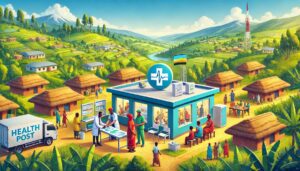I was just a toddler during the 1994 Genocide against the Tutsi—too young to comprehend the horrors unfolding around me. Yet, the events of that time have shaped my entire life. My father was one of the over a million lives taken during those tragic 100 days. My mother, a pillar of strength, raised my three siblings and me in a world shattered by violence, grief, and uncertainty. Even now, 30 years later, the scars of the genocide remain etched into our lives, highlighting the critical need for mental health awareness and support for survivors like us.
Living Through the Aftermath
Growing up, my understanding of the genocide was pieced together through whispers, silences, and the pain etched on my mother’s face. She carried deep trauma yet worked tirelessly to shield us from it. Life in post-genocide Rwanda was a battle against poverty, the immense challenge of rebuilding, and the invisible burden of grief.
No matter how much we tried to move forward, the shadows of trauma lingered. I still struggle with nightmares and inherited memories that feel as vivid as my own. The absence of my father, a constant void, has been a lifelong burden, underscoring the importance of trauma healing and mental health support for survivors.
Why Mental Health Awareness is Crucial in Post-Genocide Rwanda
Over the past three decades, I’ve come to understand the profound role of mental health awareness in healing survivors and addressing inherited trauma among post-genocide generations. For survivors, the trauma of the genocide didn’t end when the violence stopped—it followed us into every relationship, every silence, and every dream.
- Breaking the Silence Around Mental Health:
In many Rwandan families, including mine, mental health was a taboo topic. But silence only intensifies pain. Breaking these barriers through community healing programs and open discussions is the first step toward nationwide healing. - Supporting Survivors Through Healing Programs:
Survivors need safe spaces to share their stories and feel heard. Rwanda’s Unity and Reconciliation initiatives have been a beacon of hope, creating opportunities for survivors and perpetrators to engage in dialogue, fostering mutual understanding, and emotional recovery. - Addressing Generational Trauma:
The children born after the genocide carry their form of trauma, passed down through the emotional weight of a nation rebuilding itself. It’s vital to teach young people that seeking mental health support is a step toward resilience and not a sign of weakness.
Progress and Challenges in Trauma Healing
Over the years, Rwanda has made significant strides in promoting mental health awareness and addressing the deep scars left by the genocide. For me, healing hasn’t come from traditional counseling but from the support of my family and Rwanda’s efforts toward reconciliation.
My mother has been the cornerstone of my healing. Despite her pain, she tirelessly taught my siblings and me the value of forgiveness. She reminded us that forgiveness isn’t about forgetting—it’s about freeing ourselves from anger and resentment. Her resilience has guided me, helping me find peace in a life forever marked by loss.
But challenges remain. The stigma around mental health still looms, making it difficult for many survivors to openly discuss their struggles. There’s also the inherited trauma passed down to younger generations—trauma that often goes unaddressed. While progress is visible, it’s clear that our journey toward mental wellness as a nation is far from over.
As I reflect on the past three decades, I see how far Rwanda has come as a nation. But I also see how much work is left to do, especially when it comes to mental health. To my fellow survivors, I say this: it’s okay to seek help. To the younger generation, remember that understanding the past doesn’t mean being trapped by it.
Mental health awareness is not just a personal issue—it’s a national one. It’s about building a Rwanda where everyone, from survivors like me to the post-genocide youth, can thrive. Let’s continue to open our hearts and minds to this conversation.
At Rw Pharma, we are dedicated to connecting you with the resources you need. Explore our directory to find mental health professionals, community programs, and support services across Rwanda. Together, we can foster a culture of healing, resilience, and understanding.
Author: T Ben Sano
T Ben Sano is a versatile content creator, blogger, and social media enthusiast based in Kigali, Rwanda. Passionate about storytelling, T Ben creates engaging content that connects with audiences across digital platforms. With a strong focus on travel, lifestyle, and culture, T Ben crafts valuable and inspiring blog posts, videos, and social media updates. Always exploring new trends and creative ideas, T Ben's work fosters community engagement and drives growth for businesses and brands. Reach out to collaborate or explore innovative digital solutions together.






